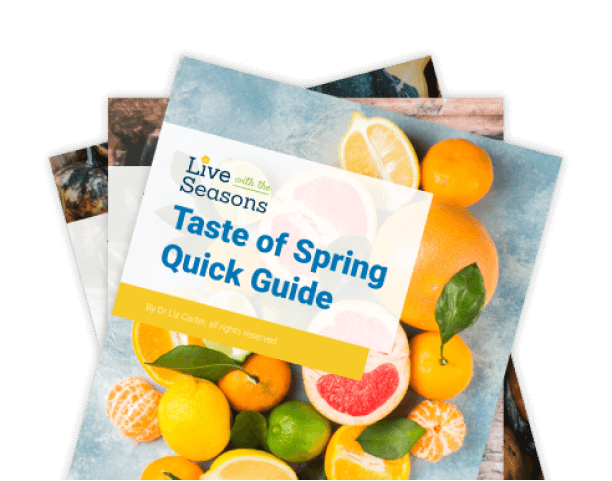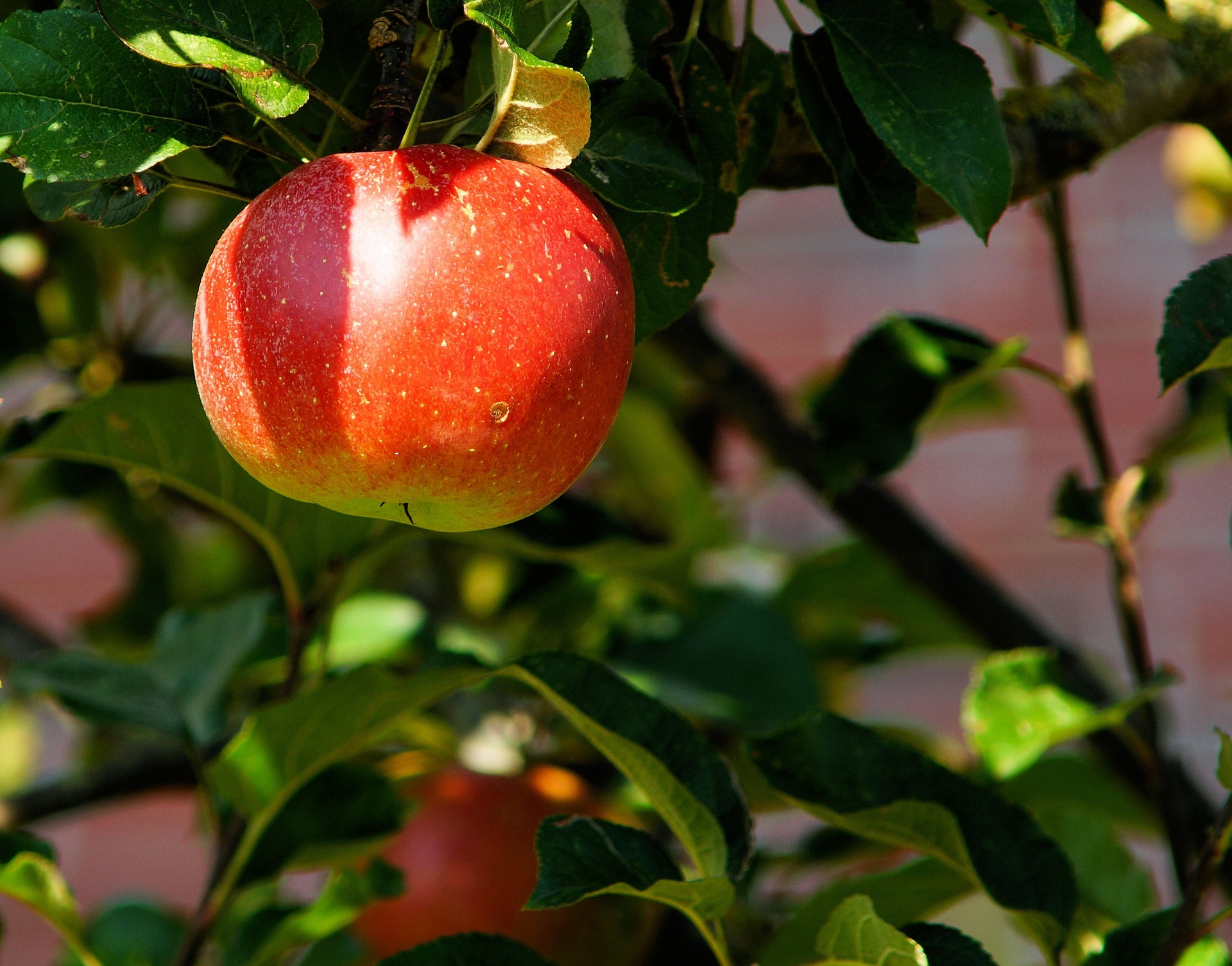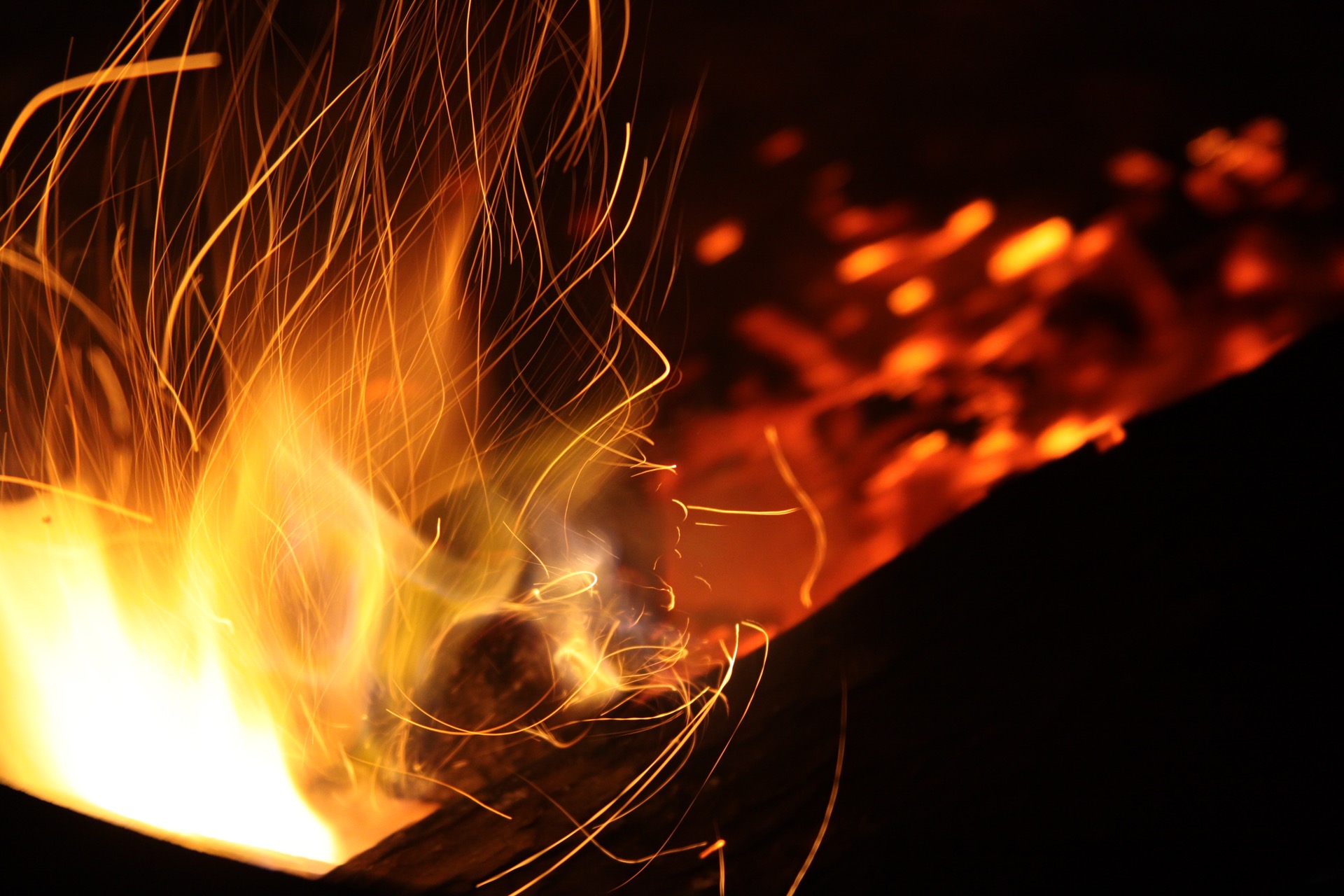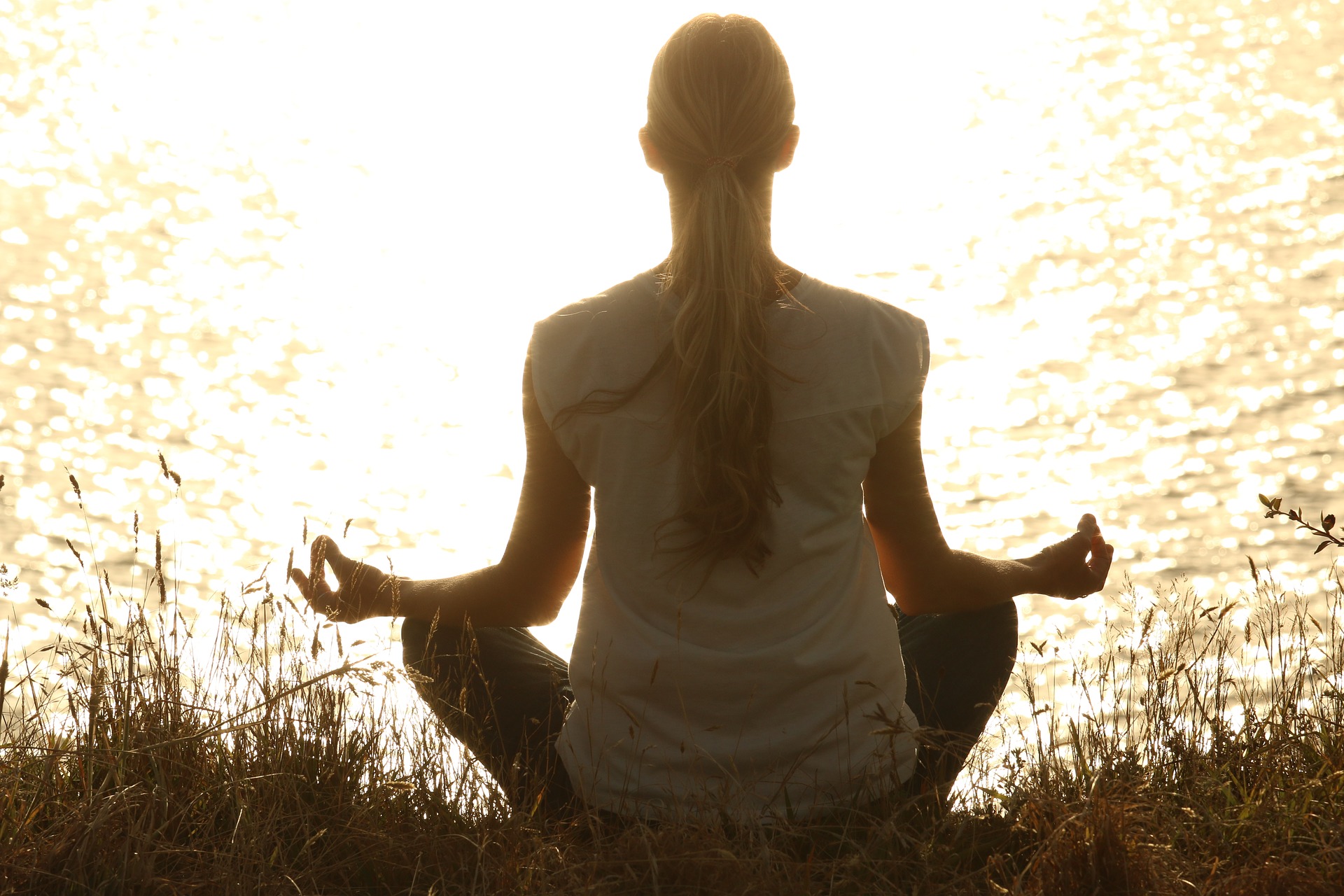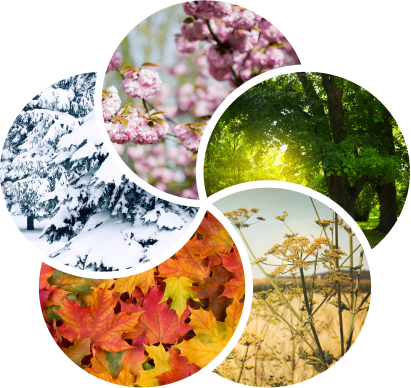Ah, summer has arrived in all of its glory.
We feel a little lighter on our feet and we’re ready to soak up the sunshine and warmth after a cold winter and tumultuous spring.
The transition from spring to summer can be a smooth one, unlike some other seasonal shifts that seem like a jolt to your system.
And each season’s energetic influence is on a continuum where it builds to a peak, then falls, while the next seasonal force starts to build.
Spring has a drive and a goal behind it; a push in a very certain direction.
And when the energy of summer is strong enough, that push and drive evaporates into more levity, fun, and aimlessness.
It’s a relief not to feel so responsible for once and just let things unfold that you’ve already set in motion.
The spontaneous and adventurous energy of summer is welcome, but if it is indulged in too much, the wheels can start to fall off the rollercoaster, so to speak.
Things move from spontaneity to chaos, joy to anxiety, and we get scattered, flaky, and can’t follow through on anything.
Have you noticed this in yourself during summers?
If you have, you’re not alone! You’re simply moving with the energy of the season.
According to Chinese medicine, the natural world exerts a strong influence over us, because, get this, we are small versions of the natural world!
We’re inextricably linked with it, so the more we can learn about the natural rhythms and cycles, the better we can survive and thrive in them.
Each season has many correspondences that will give you insight into yourself and your behavior during that time of year.
So let’s check them out!
| Element | Fire |
| Movement | Upward |
| Stage of Development | Maturation |
| Climate | Heat |
| Smell | Scorched |
| Color | Red |
| Taste | Bitter |
| Organs | Heart, small intestine, pericardium, triple heater/san jiao |
| Time of Day |
Heart: 11AM - 1PM Small Intestine: 1PM - 3PM Pericardium: 7PM - 9PM Triple heater/san jiao: 9PM - 11PM |
| Emotion | Joy, excitement |
| Sound | Laughter |
| Tissue | Vessels |
| Sense Organ | Tongue (speech) |
| Fluid | Sweat |
Whoa, that’s quite the list!
I agree. And it’s going to be super cool diving into all of this.
By the end of the article, you’ll understand why it’s so influential in your life!
And if you’re specifically looking for more information on the element of the season, I’ll cover that in some future classes.
However, you can find out your own elements right now if you’d like by taking my 5 Elements Personality Test.
Knowing your elements can help you relate to the seasons and understand yourself better.
Let’s dive in!
Get a Year of My Taste of the Seasons Guides
Improve Digestion, Mood, and Overall Health and Wellbeing in Each Season According to Chinese Medicine
Movement: Upward
The movement of summer is upward. We can see this in the element of the season, fire, in that it’s flames always reach toward the sky.
We feel uplifted, more energetic, and more relaxed than in the spring.
There’s a new lightness to our step, a serenity that things will work out and unfold as they will, and that there’s no point in trying to control everything.
Summer encourages us to take things day by day and enjoy all of our new and interesting experiences. The warmth, the sun, and outdoor activities all feed the joyous upward energy of the season.
The path upward isn’t a straight, direct line like the outward movement of spring.
Well, at the beginning of summer it can feel like there is a clear path, but as the season’s energy increases, this predetermined path gets fuzzy, and we often start flitting around, beginning one pathway, abandoning it, and trying another. And another. And another.
The freedom of summer is intoxicating after the hardline focus in spring.
We want to float away on it, enjoying the moment, the adventure, and the new perspectives that come with experiencing little bits of many things.
Life is a tasting menu of experiences — just a little bite here and there to satisfy curiosity fan the flames of contentment.
But if the energy of the season lifts us out of reality too much, it becomes destructive. We haven’t paid enough attention to events around us that now we’re off-kilter, we’ve hurt someone’s feelings, or we’ve hurt ourselves.
Dr. Liz Tips:
- The key in the summer is to be able to stay grounded and not be completely swept up in this relaxing, aimless energy that can get you into more than a few pickles if you’re not thinking ahead.
- We need to maintain some goal, focus, or structure, otherwise we end up going nowhere (unless going nowhere is totally cool with you for a few months — then embrace it!). It doesn’t mean we have to drive toward our goals like maniacs. In fact, that would be working against the season. Instead, experiment! Get creative. Don’t be afraid to try new solutions or connect with others to see what input they can offer.
- Structure is not easily cultivated in summer, but it behooves us to make the effort to keep some semblance of it in our lives. Too much upward energy disconnects us from reality, and leaves us drifting anxiously until we can focus enough to ground ourselves again.
Stage of Development: Maturation
The stage of development of summer is maturation.
Spring’s energy is strong and forceful, trying to establish new growth and viability, and summer reaps the benefit of this hard work.
If we equate the cycle of a day to summer, the peak of sunshine is analogous to the season.
We’re no longer struggling for those first bits of growth as we were in the spring. The seed has broken through it’s shell, broken through the surface of the soil, has leafed out, and is flourishing.
Plants will flower and fruit, both of which are pleasant and intoxicating to the senses, much like the season of summer.
Very little, if anything, needs to be tended to at this point, assuming soil and growing conditions are good. Things have been set in motion and will continue of their own accord.
Dr. Liz Tips:
- This is the perfect time for feedback on your projects. We’ve done the work of building up to our goals and producing something, now it’s time to be a bit more hands off and see how the world responds. We become less attached to how we’re going to get somewhere, and develop more patience around the process.
- Stop the push and start relaxing. Enjoy the rewards of your labor in the spring by building in extra play time and white space. Get outside, try new hobbies, spend time with friends you haven’t seen in awhile. You’ll be surprised at how rewarding these endeavors can be this time of year, and how much more effective this mindset can make you in your life.
- Continuous growth is often encouraged in our culture, but it is not sustainable or healthy. We have to slow down, back up, and get perspective. We need to recognize how far we’ve come and let other forces outside ourselves dictate some of what happen next. This experimentation and freedom to develop is invaluable to our maturation process.
Climate: Heat
The climate of summer is heat.
Pretty obvious, right?
Things are warmer in the summertime!
Heat speeds things up — biochemically, mentally, emotionally, and more!
It’s a necessary part of the final ripening stage for fruit. We allow the sun to take over and bring to the plants to fruition through its heat.
And heat makes us sweat, which is the fluid of summer.
Heat often acts as a catalyst in many chemical and enzymatic reactions. It sparks the reaction to complete itself faster than if the reactants were exposed to a more neutral temperature.
We feel more energized because things are moving more quickly. It even feels like the season itself is moving faster, defying the laws of physics and slipping through our fingers. It’s common to hear people say, “the summer went by so fast! It seems like it just started!”
This might partially explain our penchant for cramming as much as we possibly can into the summer months. Everything is sped up, so of course we can do more! Which, by the way, inevitably makes it feel like days are going by faster.
We’re the most reactive this time of year. By reactive I don’t mean “quick to anger”, but more like at the mercy of the environment we’ve created (and the seasonal environment at large). We bounce around our surroundings like molecules in a beaker, randomly encountering ones that repel or attract us.
We learn a lot and experience more than usual, which is fun and exhilarating for awhile.
But over time it can become exhausting and chaotic.
Think about what happens on those so-hot-you-could-fry-an-egg-on-the-sidewalk summer days — we all collapse into a languid puddle, right? In a way, it’s a relief to slow down, but we haven’t done it of our own accord.
We’ve flooded and overwhelmed our system so that we just can’t cope anymore.
Heat can be soothing and pleasant, but too much of a good thing takes its toll.
Dr. Liz Tips:
- This time of year, it’s best to roll with the increased energy and have some fun! Let the warmth bubble over from from the temperature into your personality, behaviors, career, and family life. Experience the pleasantness of this relaxed and open feeling and consider how you can continue to bring it into your life even after the summer season.
- That being said, don’t be afraid to pump the breaks when things start to feel too manic or out of sorts. The best self-care during summer is for you to assess your boundaries and agenda, and see if they’re getting stretched too thin. If so, back off the social gatherings, activities, or extra workload for a bit and let the season come back into balance for you.
Smell: scorched
The smell of summer is scorched.
Like hot, dry grass that’s been burning up in the sun, or wisps of smoke from a distant forest fire.
Or, in everyday life, the smell of burnt toast, a shirt just coming out of the dryer, or hair that’s been blown dry.
You can smell this on people when they’re struggling with a fever, or in those with dominant fire elements.
A faint smell of scorched can be healthy and normal or even pleasant, but if it’s overpowering, we want to run for the hills because it can mean a fire burning out of control.
This fire, if left to run wild, can destroy years of progress and growth and leave nothing but ash and devastation behind.
Then we’re left to pick up the pieces and start the cycle over again, whereas if a little heed had been taken, we wouldn’t be in such a predicament.
Dr. Liz Tip:
- Try to notice when you smell something scorched in your environment and check in with your emotional state. Does it give you anxiety? Is it pleasant? What does it remind you of? The more we can associate our experiences in the seasons to our emotions and memories, the more present we’ll be in the season and the more aware we’ll be of its influences.
Color: Red
The color of summer is red.
Summer is hot, and heat is generally represented as red.
Red is the color of our blood and vessels, a big part of the fire element and the organs connected to it.
Emotionally, red can be associated with anger, but in this context it’s really passion.
Red is an intense color: attention-grabbing, bold, and dramatic. Just like the summer or fire element people can be.
It can also mean “Danger!”, which is a helpful warning if the heat is getting to be too much or we’ve gotten ourselves in a sticky situation with the act-first-and-ask-questions-later mantra of summer.
The strong yang energy of summer also correlates with the intensity of the color red. Yang energy is bright, active, and hot, as opposed to the yin energy of other seasons which is cooling, dark, and calm.
Taste: Bitter
The taste of summer is bitter.
I know what you’re thinking: YUM.
Some folks really enjoy the bitter flavor, but most of us with Western palates that are calibrated toward overly sweet things really dislike bitter.
Which is too bad! Bitter is a super medicinal taste.
In Chinese medicine, bitter drains heat and dries dampness.
Ah ha! Did something just click for you? The beauty of the system comes together!
Summer is hot, so nature produces foods that counteract the seasonal temperatures and protect us from overheating.
After a long day of working outside in the heat, or just being outside in the heat, doesn’t a cold beer sound amazing?
Well, it’s not just the temperature that makes you feel so pleasant, it’s also the bitter properties of the hops.
Many leafy greens have bitterness to them as well, like mustard and dandelion greens, and the best time of year to eat these nutritional powerhouses is the summer. They’re in season and they help balance your digestion.
Bitters increasing your stomach acid production, which in turn increases the production of digestive juices for all of the other organs down the line, like your pancreas, gallbladder, and small intestine.
Dr. Liz Tips:
- How do you feel about bitter foods? Do you love them or hate them? If you have a strong aversion, it might mean that you’re accustomed to too much sweet. Try adding in small amount of bitter foods or herbs (see chart below) and cutting down on the sweet. Bitter can actually be a very pleasant taste, especially if its hot outside or you run constitutionally hot as a person.
- We tend to rush our meals and thus shortchange ourselves on the production of adequate stomach acid. Adding bitter herbs or foods to your diet can help digestion and absorption.
The foods and spices listed below all have some bitter quality. Try to notice this the next time you are eating them!
Foods |
Spices/Herbs |
|
dandelion greens
|
hops
|
|
mustard greens
|
drinking bitters
|
|
bitter melon
|
gentian
|
|
coffee
|
campari
|
|
pumpkin seed
|
beer
|
|
amaranth
|
basil
|
|
rye
|
cardamom
|
|
artichoke
|
fenugreek seed
|
|
bamboo shoot
|
cleavers
|
|
broccoli
|
gentian
|
|
caper
|
comfrey
|
|
endive
|
marigold
|
|
celery
|
yarrow
|
|
kale
|
|
|
kohlrabi
|
|
|
lettuce
|
|
|
scallion
|
|
|
turnip
|
|
|
watercress
|
|
|
grapefruit peel
|
|
|
orange peel
|
|
|
rhubarb
|
|
|
tangerine peel
|
|
|
pistachio
|
|
|
liver
|
Plus you can get even more and printable cheatsheets for all seasons by joining my free Taste of the Seasons program:
Get a Year of My Taste of the Seasons Guides
Improve Digestion, Mood, and Overall Health and Wellbeing in Each Season According to Chinese Medicine
Organs
In Chinese medicine, organs have not only physical functions, but mental, emotional, and spiritual ones as well. Occasionally, the physical function of the organs overlap with our physiological understanding in Western medicine, but they also have their own unique properties.
Each season and element have organs associated with them, and summer and the fire element are unique in that instead of 2 organs, there are 4 aligned with their energies.
Let’s take a look at how these organs correlate with summer.
Heart
The heart, in the kingdom of the body, is the emperor. It governs all other organs, which act like court officials.
If the emperor is well, the officials can do their job. If the emperor is weak or out of balance, the entire kingdom can be throw off.
A healthy emperor embodies the principle of wu wei, which, concisely, means doing nothing, or allowing events to unfold as they should. Knowing when to intervene and when to stay put. And when intervention needs to happen, it should be effortless.
The emperor has total power over his people, like the heart over the body. A healthy heart has no obstructions and is an empty receptacle that blood passes through. We can easily see that the vessels are the tissue of the heart, in that they are extensions of it, empty and allowing blood flow.
The heart's main function in Chinese medicine is to be a resting place for the spirit, or shen.
The shen can be seen through a healthy radiance or sparkle in the eyes; the stronger the sparkle, the greater the shen. If a person’s eyes seem inauthentic or veiled, their shen is unseated, dispersed, or lacking.
The shen affects many things that in Western medicine would be associated with the brain: short-term memory, ability to think, reason, and maintain focus, and our ability to sleep.
If uprooted from its place in the heart, the shen can cause sleep disturbances, vivid dreams, emotional swings and volatility, and scattered thinking.
When in balance, the shen and heart are quiet rulers, needing only to be present for the rest of the body to do its job.
Dr. Liz Tips:
- Do small things that bring you joy and practice daily gratitude to keep your heart healthy and balanced. The heart thrives with optimism, ease, and laughter, and it can easily boost these qualities in others when the emperor is on his throne.
Small Intestine
The small intestine is all about sorting in Chinese medicine.
Its function is to separate the pure from the impure, keeping the nutritive substances we need to build qi (our life force) and blood in the body, and routing the waste products to the large intestine where they can be released.
From a Western point of view, the small intestine’s function is very similar, in that it helps to digest and assimilate nutrients that we need to live.
However, the sorting function of the small intestine in Chinese medicine isn’t only physical. We need to be nourished mentally and emotionally as well, choosing what we want to integrate into our being.
And in our modern world we have so many things to chose from. More than any other time in history. It's a personal hypothesis of mine that this is part of the reason why disorders of the small intestines, like Crohn’s, IBS, and SIBO have become more common. We have so much to sort through mentally that the small intestine gets overwhelmed.
The inability to separate the pure from the impure muddies the psychological and emotional waters. It can manifest as indecisiveness, but not in the same way as the gallbladder.
If the small intestine function is out of whack, people have a hard time staying focused on what their choices are. They don’t even get to the making a decision part (gallbladder), because they’re so unclear as to what they need to do.
In relationship impaired function can lead to confusion because of an inability to separate themselves from another one minute, and becoming distant or ambivalent the next.
Dr. Liz Tips:
- If you’re feeling overwhelmed by choice, simplify. Get back to the basics that make you happy. Oftentimes indecision comes from a loss of self — who am I and what do I actually want? Yes, you can have an existential moment like this when you’re looking at 15 brands of toothpaste (or types of donuts). Take the time to answer these questions, and suddenly separating what you do and don’t want becomes much easier.
- If you need to organize or simplify your physical world, check out The Life Changing Magic of Tidying Up. People seem to dig it.
Pericardium
The pericardium is also known as heart protector.
Though just a fluid-filled sac in the Western world, the pericardium plays an integral role as the guardian of the emperor in Chinese medicine.
Only certain people are allowed in to see the emperor while others are kept at bay. When the heart is well-protected, it fills us with its emotion, joy.
The pericardium acts like a gate. When it’s functioning well, it opens easily for those allowed in and stays shut to those who aren’t.
We can see this play out through day-to-day interactions with people you know at different familiarity levels. You might cover one range of subjects in conversation with and old friend, and interact very differently with a clerk at the post office. Both interactions are appropriate in context.
When the pericardium is imbalanced, the gate can get stuck open and we flood everyone with our emotions, intimate stories, and have poor boundaries. The gate can also get stuck closed, and we seem aloof, unable to connect, and cold.
Dr. Liz Tip:
- Oftentimes if you’re having trouble with personal boundaries in relationships or interactions, it can be a pericardium issue. It’s a good time to slow down, withdraw a bit, and recenter. Ask yourself who you really want in your life. Who is privileged enough to have direct access to your heart? There’s a reason why there’s an entire organ in Chinese medicine dedicated to its protection! Having an open heart is beautiful, but only in the right context and with the right people.
Triple Heater/San Jiao
There is no analogous organ in Western medicine to the triple heater or san jiao. The closest we can come is to say that it regulates lymph, circulation, and metabolism, and to be honest, that’s not really in the same ballpark.
In Chinese medicine, the triple heater, or triple burner, is meant to regulate the flow of fluid throughout its three burners. It also plays a large role in heat regulation. It’s like a total body irrigation system that’s attuned to temperature as well.
The term “burner” comes from the idea that each area is a transformative space that changes the properties of whatever is in it through the application of heat — like cooking meat over a fire, or boiling rice to make it edible.
Each burner has different organs and fluid associated with it.
The upper jiao (burner) is at the chest level and houses the heart, pericardium, and lungs and its fluids are like mist. The burners function here is to distribute this mist over the aforementioned organs, supplying them with protective qi.
The middle jiao contains the stomach, spleen, liver, and gallbladder and resides at the level of the solar plexus. Its fluid is compared to a muddy pool, as its job is assisting the digestive organs (mainly stomach and spleen) with the process of rotting and ripening food for it to be transformed into nutritive qi and transported throughout the body.
The kidneys, small intestine, bladder, and large intestine reside in the lower jiao in the lower abdomen. This fluid is equated to a drainage ditch, as the organ functions here are separating the pure from the impure, absorbing water, and excreting wastes.
It’s difficult to spot when the triple heater is out of balance because the organs in each jiao will be the ones to act out. It’s important to look deeper at our mental and emotional outlook to see if there is a fire element imbalance as well. Clues to imbalance could be improper fluid metabolism or temperature regulation, but again, other organs might be causing this distress.
Though operating invisibly in the background, the triple heater is essential to life. We must have heat to live.
Think of the triple heater as a kindly grandma, tending to a fire that’s heating up a large pot of soup. If she makes the fire too hot, the fluids will evaporate and the soup will be too thick. If the fire is too cold the soup will be thin and won’t cook. Through this regulation, she smooths out what could be large fluctuations in temperature, fluid, and properly cooks the food so its energy will bring us nutritive qi. This is the essence of the triple heater.
Time of Day
In Chinese medicine, every 2 hour period on the clock is associated with a different organ.
Let’s check in with the fire organs and see where they fall during the day and what that means for you.
Organ |
Highest Energy |
Lowest Energy |
|
Heart
|
11AM - 1PM
|
11PM - 1AM
|
|
Small Intestine
|
1PM - 3PM
|
1AM - 3AM
|
|
Pericardium
|
7PM - 9PM
|
7AM - 9AM
|
|
Triple heater/san jiao
|
9PM - 11PM
|
9AM - 11AM
|
Anytime of the year, but particularly in the summer, these organs can be under or overactive.
Sometimes restlessness between 11PM - 1AM isn’t an overcharged gallbladder, but an undernourished heart. People have trouble falling asleep, but if waking, especially with anxiety or vivid dreams, it could be related to the heart.
Many cases of heart failure occur between 11PM - 1AM, when the heart energy is the lowest.
Heart attacks that occur because of an excess pathological condition tend to occur midday, between 11AM - 1PM.
It’s common for digestion to be at its peak between 1PM - 3PM where the small intestine energy is the highest, then capacity decreases the rest of the day.
1 - 3PM can be a great time to sort through mental or emotional matters or to clarify decisions that have felt muddy in your head for awhile. It’s a great creative brainstorming time.
Pericardium time from 7 - 9PM are common socializing hours, so an imbalance in regulating boundaries will be more acutely felt through either the inability to connect or pathological oversharing. With an imbalance, energy for social engagement can be very low during these hours or very high; either extreme is a tip off that the pericardium isn’t functioning optimally.
With a triple heater imbalance, you may notice temperature regulation issues in any of the three jiaos or throughout the body between 9PM - 11PM. These are also common socializing hours, and if your triple heater is depleted, sometimes you’ll become overly hot or overly cold during this time while you’re out and about.
Dr. Liz Tips:
- Eat the majority of your calories for the day before 3PM and have a light dinner. It’s easier on your digestion, and can be a useful weight loss tool as heavier dinners give us more energy than we’ll burn in the rest of the day.
- Allow a little time and space for your small intestine to work after lunch. Take a break, go on a walk, just don’t try to sort anything else for a bit after eating or you can deplete its function and decrease your ability to digest and absorb your food.
- If you’re restless between 11PM - 1AM, take an epsom salt bath. It’s my favorite remedy for sleep, and the high levels of magnesium relax the nervous system and blood vessels, nourishing the heart.
- Take a break from socializing in the evening if you feel like boundaries have been hard to enforce lately. Do something that’s meaningful to you and brings you joy to help restore heart and pericardium energy.
Emotion: Joy, excitement
The emotion of summer and the fire element is joy or excitement.
Joy is such a wonderful feeling; it’s light, effervescent, and infectious, just like fire element personalities.
It makes us feel welcome and at ease, encouraging us to relax and settle in, and to let go of the rush and hurry we often feel.
When we have an appropriate amount of joy, we are best able to embody wu wei, or action through non-action. We intuitively understand when to let events unfold, and where and if our own intervention is needed.
By being joyful, we spread this happiness and satisfaction to others easily, showing them kindness and benevolence.
When you’re in this state, it’s easy to help all those you interact with lead a better life because you radiate shen, or spirit. We are showing up as emperors, or archetypal kings and queens in our own existence, which is one of the highest purposes we can fulfill.
However, the pendulum can swing both ways from this point of balance. If we have too little joy, we become depressed, bitter, and insular. We have a hard time genuinely connecting with others, whereas previous it had been easy.
And yes, we can, in fact, have too much joy. It can manifest as mania in its extreme state, but is most often seen as erratic, irrational, uncontrollable, dramatic elation and agitation. We become emotionally volatile, perhaps lashing out when we shouldn’t or losing control of our decision-making process and boundaries so we dive into situations heedlessly.
Dr. Liz Tips:
- Meditation can be immensely helpful to connect with your shen. It clears the clutter and helps you connect with your deeper, more authentic self. Start with 5 minutes a day and work up to greater lengths of time as you become more skilled.
- Ask yourself how you can show up in life as an emperor, king, or queen. This is not a tyrannical monarch like we see in Game of Thrones or so many fantasy series, but a kind, gentle leader who rules lightly in the background, giving their people the gift of autonomy, freedom, and a safe space to become who they need to be.
Sound: Laughing
The sound of summer and the fire element is laughing and it is the sound that naturally emanates from the heart.
We hear this in the voice of fire elements throughout the year, and in all other personality types during the summer.
The sound of laughing is a little more subtle than actual laughter. It’s as if someone is constantly talking with a smile or is right on the edge of laughter and happens most when discussing enjoyable or exciting subjects enthusiastically.
It does commonly bubble up into a small laugh during conversations, rising up through the chest and toward the heavens.
The sound of laughter immediately puts people at ease, and it truly is the best medicine for the soul.
Laughter embodies the joy and warmth of summer, connects us to others meaningfully, and helps us build new relationships.
Summer is a light, fun, and beautiful time of year. A wonderful contrast to the deep introspection of winter, intense rush of spring, abundance and stable late summer, and decreasing breakdown of fall.
It’s wonderful to fall into its easy rhythm and just hang back from life a little bit, basking in the fruits of the labor of other seasons (we get to do this in late summer a bit, as well).
If we can embrace the energy of this season, we get a chance embody our most authentic selves and bring this experience with us through the rest of the seasonal transformations.


